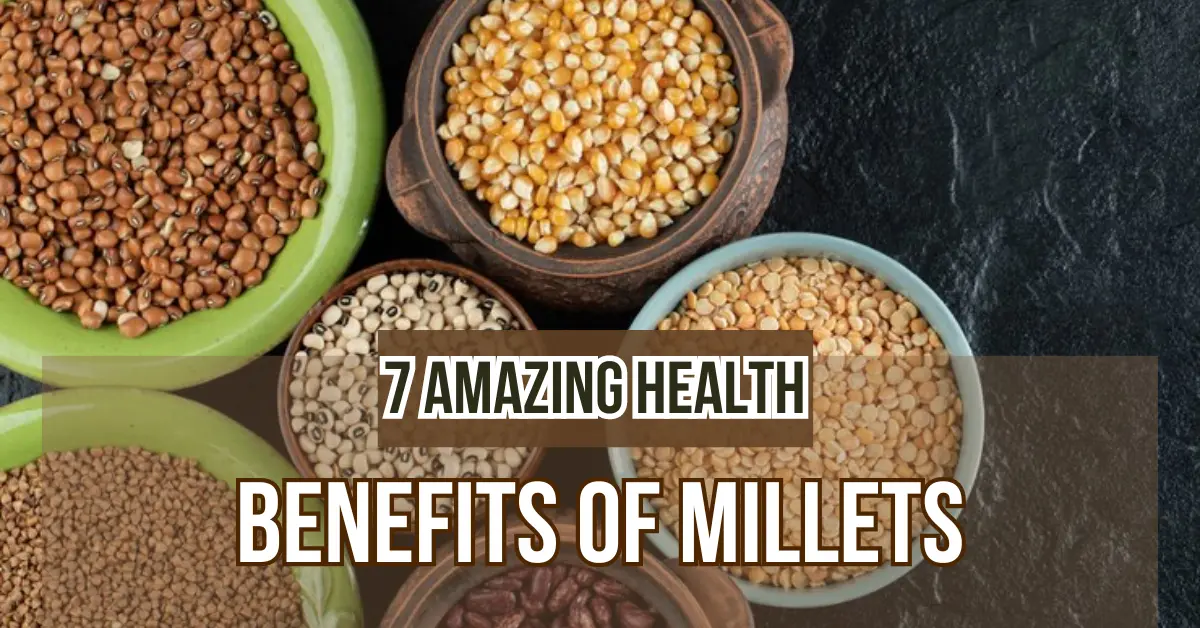
Millets are small, nutritious grains that include varieties like pearl millet, finger millet, and foxtail millet. They are high in fiber, vitamins, and minerals, and are great for overall health. Eating millet helps with digestion, supports heart health, and can manage blood sugar levels. They are also rich in antioxidants and can aid in weight management. Including millet in your diet can offer a tasty and healthy alternative to other grains.
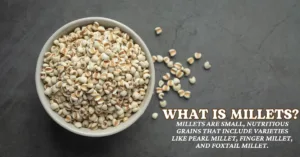
7 Amazing Health Benefits of Millets
Millets are small-seeded grains that have been around for thousands of years. They’re loaded with nutrients and contribute many health advantages. Let’s look at 7 great health benefits of millets and reasons to add millets to your diet.
Millets are very nutritious
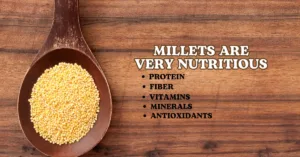
Millets are full of good things your body needs. They have:
- Protein: Millets contain a good amount of protein, which helps build and repair your body’s tissues. Protein is also essential for making enzymes & hormones.
- Fiber: Millets are high in fiber, which is great for your digestive system. Fiber helps you feel full and can prevent constipation.
- Vitamins: Millets have many vitamins, especially B vitamins. These vitamins help your body turn food into energy and keep your nervous system healthy.
- Minerals: Millets are rich in minerals like iron, magnesium, and phosphorus. These minerals are important for various body functions, from making red blood cells to keeping your bones strong.
- Antioxidants: Millets contain antioxidants that protect your cells from damage. This can help prevent many diseases.
By eating millet, you’re giving your body a wide range of nutrients it needs to stay healthy.
Millets can help control blood sugar

If you’re worried about diabetes or want to keep your blood sugar steady, millets might be a good choice for you. Here’s why:
- Low glycemic index: Millets have a lower glycemic index. This means they don’t cause a quick spike in blood sugar after you eat them. Instead, they release energy slowly over time.
- High fiber content: The fiber in millets slows down how quickly your body absorbs sugars. This assists in maintaining your blood sugar levels more stable.
- Better insulin response: Some studies show that eating millet can help your body respond better to insulin. Insulin is the hormone that regulates your blood sugar.
Adding millet to your meals can be a smart way to manage your blood sugar, especially if you have diabetes or are at risk of getting it.
Millets are good for your heart
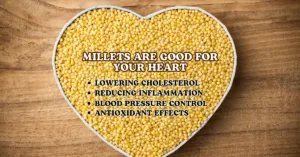
Eating millet regularly might help keep your heart healthy. Here’s how:
- Lowering cholesterol: Some types of millet have been shown to lower “bad” cholesterol (LDL) and increase “good” cholesterol (HDL) in the blood. This is good for your heart fitness.
- Reducing inflammation: Millets contain compounds that can help reduce inflammation in your body. Chronic rash is related to heart disease.
- Blood pressure control: The magnesium in millets can help relax your blood vessels. This might help lower high blood pressure, which is a risk factor for heart disease.
- Antioxidant effects: The antioxidants in millets can protect your heart cells from damage.
By including millet in your diet, you might be doing your heart a big favor.
Millets can help with weight management
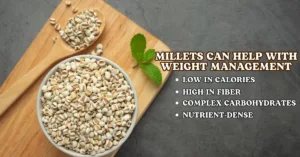
If you’re trying to maintain a healthy weight or lose some extra pounds, millets could be a helpful addition to your diet. Here’s why:
- Low in calories: Millets are relatively low in calories compared to many other grains. This means you can eat a satisfying amount without consuming too many calories.
- High in fiber: The fiber in millets helps you feel full for longer. When you feel full, you’re less likely to overeat or snack on unhealthful foods.
- Complex carbohydrates: Millets are a source of complex carbohydrates. These take longer to digest, which can help keep your energy levels stable and prevent sudden hunger pangs.
- Nutrient-dense: Millets provide a lot of nutrients for relatively few calories. This means you’re getting good nutrition without excess calories.
Remember, no single food can cause you to lose weight. But as part of a balanced diet and healthy lifestyle, millets can support your weight management goals.
Millets are gluten-free
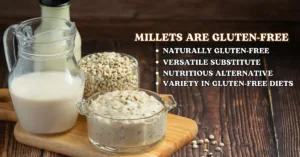
For people who can’t eat gluten, millets are a great option. Here’s what you need to know:
- Naturally gluten-free: All types of millet are naturally free from gluten. This makes them safe for people with celiac disease or gluten sensitivity.
- Versatile substitute: Millets can be used in many ways to replace gluten-containing grains. You can use them to make bread, porridge, or as a side dish instead of wheat, barley, or rye.
- Nutritious alternative: Unlike some gluten-free products that might lack nutrients, millets are very nutritious. They deliver a good proportion of protein, fiber, vitamins & minerals.
- Variety in gluten-free diets: Millets offer variety for people on gluten-free diets. They come in different types with slightly different flavors and textures.
Even if you don’t need to avoid gluten, millet can be a healthy addition to your diet. They add variety and nutrients to your meals.
Millets may help prevent anemia
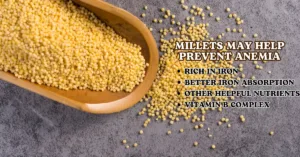
Anemia is a situation where you don’t have enough nutritious red blood cells to bring oxygen to your body’s tissues. Millets might help prevent this problem. Here’s how:
- Rich in iron: Many types of millet are good sources of iron. Your body needs iron to make hemoglobin, the protein in red blood cells that carries oxygen.
- Better iron absorption: Some millets, like pearl millet, have been shown to help your body absorb iron better. This is especially important for preventing anemia.
- Other helpful nutrients: Millets also contain other nutrients that help prevent anemia. For example, they have copper, which helps your body use iron to form red blood cells.
- Vitamin B complex: Millets are rich in B vitamins, including vitamin B12 and folic acid. These vitamins are important for making red blood cells and preventing certain types of anemia.
While millet can help, it’s important to eat a varied diet with other iron-rich foods too. If you’re worried about anemia, talk to your doctor.
Millets support digestive health
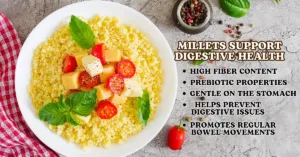
A healthy digestive method is important for overall well-being. Millets can play a role in keeping your digestive system happy. Here’s how:
- High fiber content: Millets are rich in dietary fiber. Fiber is essential for good digestion. It helps food move through your digestive tract and prevents constipation.
- Prebiotic properties: Some types of fiber in millets act as prebiotics. These feed the good bacteria in your gut, which is important for digestive health and overall immunity.
- Gentle on the stomach: Many people find millet easy to digest. They might be a good option if you have a sensitive stomach.
- Helps prevent digestive issues: The fiber in millets might help prevent digestive problems like diverticulosis, a condition where small pouches form in the colon wall.
- Promotes regular bowel movements: Eating fiber-rich foods like millet can help keep your bowel movements regular, which is important for removing waste and toxins from your body.
By including millet in your diet, you’re giving your digestive system good support.
How to add millet to your diet

Now that you know about the health benefits of millet, you might be wondering how to eat them. Here are some easy ways to add millet to your meals:
- Use millet flour in baking: You can replace some or all of the wheat flour in your recipes with millet flour. This works well for breads, muffins, and pancakes.
- Cook millets like rice: You can cook most millets just like you cook rice. Use them as a side dish or a base for curry or stir-fry.
- Make a millet porridge: Cook millet with milk or water to make a warm, comforting breakfast porridge.
- Add to soups and stews: Cooked millets can make your soups and stews more filling and nutritious.
- Use in salads: Cooked and cooled millets make a great addition to salads. They add a nice texture and help make your salad more filling.
- Make millet patties: Mix cooked millet with vegetables and spices, then shape into patties and cook for a healthy vegetarian meal.
- Sprout millets: Sprouted millets are very nutritious and can be added to salads or sandwiches.
Remember to start with small amounts if you’re not used to eating a lot of fiber. Drink plenty of water when you increase your fiber intake.
Conclusion
Millets are small grains that pack a big nutritional punch. They’re good for your heart, can help control blood sugar, support weight management, and offer many other health benefits. They’re also gluten-free, making them a great option for people who need to avoid gluten.
Whether you’re looking to improve your diet or just want to try something new, millets are worth adding to your meals. They’re versatile, tasty, and very good for you.
Remember, while millets are healthy, it’s important to eat a varied diet with lots of different foods. This guarantees you get all the nutrients your body requires. If you have any health conditions or concerns, it’s always a good idea to talk to your doctor or a registered dietitian before making big changes to your diet.
FAQs
1. What are the health benefits of eating millet?
Millets are high in fiber, vitamins, and minerals, which aid digestion, support heart health, and help control blood sugar. They also provide antioxidants and may assist in weight management.
2. How do millets help with digestion?
Millets are rich in dietary fiber, which promotes healthy digestion and regular bowel movements. This fiber helps prevent constipation and supports a healthy gut, making digestion smoother and more efficient.
3. Can millet assist in managing blood sugar levels?
Yes, millets have a low glycemic index, which helps manage blood sugar levels by releasing energy slowly. This can be useful for people with diabetes or those looking to support stable power levels.
4. Are millets good for heart health?
Millets contain heart-healthy nutrients like magnesium and potassium, which help regulate blood pressure and reduce cholesterol. Their high fiber content also supports cardiovascular health by preventing heart disease.
5. How do millets support weight management?
Millets are low in calories and increased in fiber, which assists you to feel full for longer. This can reduce overeating and assist in weight management, making them a great addition to a balanced diet.
Also Read:
7 Health Benefits of Apples: a Must-Have for Your Diet
Health Benefits of Almonds: Your Daily Dose of Wellness
References:
https://millets.res.in/m_recipes/Nutritional_health_benefits_millets.pdf
https://www.recentscientific.com/sites/default/files/14234-A-2019.pdf
https://journalijecc.com/index.php/IJECC/article/view/3261
Disclaimer: The information provided in this blog about the health benefits of millets is for educational purposes only and should not be considered medical advice. Consult a healthcare provider before making significant dietary changes or using millets for health purposes.
Related post

7 Health Benefits of Assam Tea


